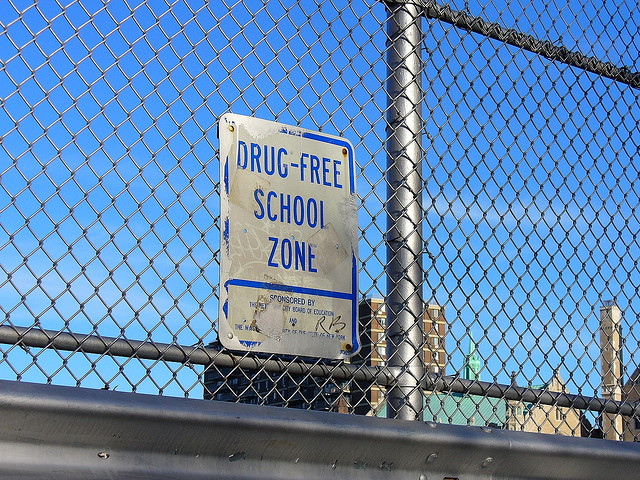Quick Guide to Texas Drug-Free Zones
The state of Texas has established drug-free zones across the state. These zones are designated as special areas where drug activity is strictly prohibited. Getting caught with drugs within one of these zones can result in enhanced punishments. This is because these zones are considered areas where drugs have the potential to be especially harmful to the community. Even a minor drug infraction committed within one of these zones has the potential to have long-lasting, severe consequences.
Examples of Drug Free Zones
In most cases, drug-free zones are places where the presence of drugs is considered especially harmful. For example, these zones are usually areas where young children are often present. Because drugs are considered especially harmful for young children, bringing drugs into an area where children are often present can be met with harsh punishments. Some typical drug-free zones can include:
- Schools
- Daycare centers
- Playgrounds
- Video arcades
- Youth centers
Drug Free Zone Infraction Punishments
Typically, the punishments for possession or distributing drugs while in a drug-free zone are enhancements on standard drug penalties. In a way, these punishments can be thought of as extended penalties that intensify the punishments for standard drug penalties. For example, the punishment for possession of more than one ounce but less than 4 ounces of cocaine in Texas is usually considered a felony of the third degree. However, possession of the same amount of cocaine in a drug-free zone is a felony of the second degree, potentially resulting in a punishment of:
- Conviction on a second degree felony charge
- Incarceration in prison for two to 20 years
- A fine of up to $10,000
In addition to an enhanced criminal charge category, a conviction for a drug charge in a drug-free zone can have additional penalties. In some cases, this can mean the removal of any “good conduct” time that is usually accrued while serving a sentence in jail or prison. This can mean that:
- Incarceration penalties must be served completely
- Early release may not be an option
Other enhanced penalties may also apply in drug-free zone crimes. For possession of marijuana, a convicted offender may face:
- Driver’s license suspension
- Civil asset forfeiture
A driver’s license suspension for a marijuana conviction in a drug-free zone may last up to 180 days for a first-time adult offender. Subsequent offenses may result in longer suspensions.
Civil asset forfeiture is a practice that allows law enforcement to seize or confiscate items or property used in the commission of a crime. For example, cash that is obtained from selling drugs may be seized by law enforcement upon an arrest. Under the law, the police are not obligated to return this money or any other items that they may have seized while investigating a drug crime.
Drug-Free Zone Defenses
The law is very exact about the definition of a drug-free zone. For example, Texas law states that any drug crime conducted within 1000 feet of a drug-free zone may be subject to enhanced penalties.
Because of this exact definition, it may be possible to show that a defendant was actually outside the range of space for which this enhancement applies. If a defense attorney can submit evidence which proves that a defendant was even a few feet outside of the range of the drug-free zone, the court may decide that the enhanced charges do not apply.
Additionally, first-time drug offenders may be able to submit a guilty plea in exchange for a reduced sentence or probation instead of jail time.
It is possible to defend against a drug charge that occurred within the bounds of a drug-free zone in Texas. An attorney may be able to use evidence to demonstrate the defendant’s innocence or to highlight an issue that may result in dropped or reduced charges.
If you’ve been caught in a drug-free zone, contact attorney Rand Mintzer to protect your rights and help preserve you freedom. We are available 24/7. Call (713) 862-8880 or email us to get the aggressive defense you deserve.
Photo by Metro Centric | Used under Creative Commons image attribution license 2.0

